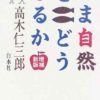
はじめに
「古代の最も美しい存在であるあのプラトンの身に、どこからあのような病気がやってきたのか?あの邪悪なソクラテスが彼を堕落させたのではあるまいか?ソクラテスこそは青年を堕落させる誘惑者ではなかったか?さればこそ彼は、毒杯をあおぐに値してのではないか?」(ニーチェ『善悪の彼岸』[1])
この問いに対するソクラテスの弁明です。彼はまさしくこの疑いで訴追されたのです。ニーチェの問は今から140年前。この話の舞台はその2200年前です。
「弁明」とは
「弁明」と言うと「言い訳」のように聞こえますが、英語でいえば"Apology"、日本語で「謝罪(ごめんなさい)」でもありますね。日本語にすると二つは全く違う言葉です。
でも、欧米人には同じ言葉なんですね。文化の違いでしょう。NEWYORK timesでは森氏は"he apologized the next day"(次の日謝罪した)とあります。これは「次の日弁明した」と同じ意味なんでしょうか。まあ、「謝罪する」というのは日本語でも「悪いと思ってる」とか「反省している」という意味ではないと思いますけど(笑)。[2]
ソクラテスは若者をだめにしたのか
ソクラテスは二つの罪で告訴されています。一つは「若者をだめにした」ということ。もう一つは「神を冒涜した(邪神を広めた)」ということです。
彼はデルポイの神(アポロン)に、「ソクラテスより知恵のあるものはいない」と言われたので、それを確かめるために、色んな人(哲学者、医者、技術者など)に聞いて回ったといいます。それで、もし私が彼らと違うことがあるなら「私は知らない」ということを「知っている」ということだ、と言います。「無知の知」ですね。
なかなか「知らない」って言いにくいですよね。それでついつい「知ったかぶり」をしてしまします。単に見栄を張る場合と、立場上、そう言わなければならないときがあると思いますが。すべてを知っている人間なんているはずないのに。[3]
その言い訳とも、説明とも、自慢話とも思える「弁明」で、陪審員を怒らせてしまいます。
ソクラテスはかなりやばいです。頭がいいのはわかりますが、何度も「神の声を聞いた」「神の声に従った」と言っています。私は彼が本当に聞いたんだと思います。多分、当時ももう「神の声」を聞ける人は殆どいなかったんじゃないでしょうか。民衆は彼を羨ましく思いながら、バカにしていたんじゃないでしょうか。自己弁護のために。[4]
プラトンとソクラテスの関係
プラトンはお金持ちのボンボン。ソクラテスは職人の息子、だと思います。もちろん想像ですけど。[5]
ソクラテスは貧乏で、罰金を払うお金がありません。彼は、自分は無罪だと思っているので、払う気はありませんが。有罪判決を受けたあとも「自分の刑には国立迎賓館での食事がふさわしい」というくらいです。
「私に払えるのは1ムナだ」と言います。現在の日本円でいくらになるかは分かりません。1ムナは100ドラクマ。1ドラクマで一家族が一日暮らせたという説もありますから、100日分のお金ですね。でもこれは、たとえ罰金を払うとしてもお金がない、という意味です。
すると、プラトンたちが口を出して、「私たちも出します」と言います。弟子たちが出すといった額は30ムナ。約8年分の生活費ですね。ソクラテスの気持ちを全然解っていなかったんじゃないでしょうか。
ソクラテスはあくまでも無罪だと思っている(というか、有罪になると思っていたけど仕方がないと思っていた)から、量刑はどうでも良かったのです。「国外退去といえば納得してくれるかもしれないけど、これからも対話を止めるつもりはない」と言います。だから死刑になっちゃった。
プラトンは何をしたのか
彼はソクラテスを信じていたけど、「ソクラテスの無実」は信じていなかったのだと思います。プラトンをよく「理想主義者」といいますが、お金で解決しようとしたわけです。現実主義、俗っぽいと思いませんか。
ソクラテスはそんなことは望んでいなかったと思います。お金のために哲学をしているわけじゃないし(だから貧乏だった)、生きることは対話することだったのです。「死というものは知らない。だって死んだことないから」と自分の思想で生きたのです。プラトンよりよっぽど頭でっかちです。
プラトンも訴えた人たちと同じような目でソクラテスを見ていたのではないでしょうか。彼のソクラテスに対する敬愛は自己否定であり、自己弁護であり、自己に対する軽蔑の裏返しだったんじゃないでしょうか。
自分の罪をソクラテスになすりつけたのです。だからこそ生きていてもらわなければならなかったのです。
ソクラテスの死は、プラトンを解放し且つ絶望に陥れたはずです。そこから逃れるために、彼はアカデミアを建てました(建てるだけのお金があった)。生徒(弟子)を育てました。
ソクラテスに罪が有ったとすれば、それはそういう(2500年後まで読まれる本を書くほど優秀だけど師のことを理解しなかった、あるいは勘違いをした)弟子を創ってしまった、ということなんじゃないでしょうか。[6]
ソクラテスの死
ソクラテスは弟子が「逃げましょう」と助けに来たのに、毒杯を飲んて死んでしまいます(そのことはこの著作にはありません)。死は法廷に行く前から覚悟していました。神が行くのを止めなかったからです。でも、彼の心の中には民衆に理解されなかった悔しさと、優秀な弟子たちに理解されなかった「あきらめ」があったのではないでしょうか。
余談 キリストについて
「イエスのような模範的な死に方」(ニーチェ『反キリスト者』)イエス·キリストも「使徒たちの小さな教団が、最も肝心な点を理解しなかったことは明白」だとニーチェは言ってます(同前)。ならばソクラテスと同じだったんじゃないでしょうか。イエスは生まれ方はブッダをまね、死に方はソクラテスを真似たのかもしれません。彼も捕らわれ殺されることを知りながら逃げませんでした。彼にも弟子たちの無理解に対する諦めがあったのかもしれません。
Introduction
"Where did such an illness come to Plato, the most beautiful being of ancient times? Did that evil Socrates corrupt him? Socrates is the seducer who corrupts the youth. Wasn't he worthy of a poisonous cup? "(Nietzsche's" Higan of Good and Evil " [1] )
Socrates's defense to this question. He was charged with this very suspicion. Nietzsche's question was 140 years ago. The stage of this story is 2200 years ago
What is a excuse ?
"Excuse" sounds like an "excuse", but it is also "Apology" in English and "apology" in Japanese. In Japanese, the two are completely different words.
But it's the same word for Westerners. It's a cultural difference. In the NEW YORK times, Mr. Mori says "he apologized the next day" (he apologized the next day). Does this mean the same thing as "I justified the next day"? Well, I don't think that "apologizing" does not mean "I think it's bad" or "I'm reflecting on it" even in Japanese (laughs). [2]
Did Socrates spoil the youth
Socrates has been charged with two charges. One is that "youth was spoiled". The other is "blasphemy of God (spreading evil gods)".
He was told by the god of Delphi (Apollo) that "nothing is more wise than Socrates," so he should ask various people (philosophers, doctors, engineers, etc.) to confirm it. I will. So, he says, if I'm different from them, it means "knowing" that "I don't know." It's "ignorant wisdom."
It's hard to say "I don't know". That's why I just do "Knowledge". I think there are times when you just want to look good and times when you have to say that from a standpoint. No one knows everything. [3]
The excuse, the explanation, and the "excuse" that seems to be a boastful story make the jury angry.
Socrates is pretty bad. I know he is smart, but he repeatedly says, "I heard the voice of God" and "I obeyed the voice of God." I think he really heard. Perhaps there were few people who could hear the "voice of God" at that time. I think the people were jealous of him and made a fool of him. For self-defense. [4]
Relationship between Plato and Socrates
Plato is a rich bonbon. I think Socrates is the son of a craftsman. Of course I can imagine. [5]
Socrates is poor and has no money to pay fines. He doesn't want to pay because he thinks he's not guilty. Even after he was convicted, he said, "A meal at the National Guest House is suitable for my sentence."
There is no doubt that Socrates was smart. In this excuse, he repeatedly says, "I heard the word of God" and "I obeyed it."
He says, "I can only pay one muna." I don't know how much it will cost in the current Japanese Yen. 1 Muna is 100 drachmas. There is a theory that one family could live a day with one drachma, so it's 100 days worth of money. But this means that even if you pay a fine, you have no money.
Then Plato and his friends say, "We will do it too." The amount that the disciples give is 30 Muna. It's about 8 years worth of living expenses. I think he didn't understand Socrates' feelings at all.
Socrates didn't care about the sentencing because he thought he was innocent (or rather, he thought he would be guilty but he couldn't help it). "I may be convinced when it comes to deportation, but I'm not going to stop the dialogue," he says. So he was sentenced to death.
What did Plato do
I think he believed in Socrates, but he didn't believe in "Socrates' innocence." He often refers to Plato as an "idealist," but he tried to solve it with money. Don't you think he is realist and profane?
I think Socrates didn't want that. He wasn't philosophizing for money (so he was poor), and living was dialogue. He lived with his own thought, "I don't know about death, because I've never died." He is much smarter than Plato.
Perhaps Plato was looking at Socrates with the same eyes as those who complained. Perhaps his respect for Socrates was self-denial, self-defense, and the flip side of contempt for himself.
He rubbed his sins on Socrates. That's why he had to be alive.
Socrates's death must have liberated Plato and plunged into despair. To escape from it, he built an academia (there was enough money to build it). He raised a student (disciple).
If Socrates was guilty, it would have created such a disciple (he was good enough to write a book that would be read until 2500 years later, but did not understand or misunderstood his teacher). Isn't that what it means? [6]
The Death of Socrates
Socrates came to help his disciple "let's run away", but he drank a poison cup and died (which is not in this book). I was prepared for death before I went to court. Because God didn't stop going. But perhaps there was regret in his heart that was not understood by the people and "give up" that was not understood by the talented disciples.
Digression about Christ
"A model death like Jesus" (Nietzsche'Antichrist') Jesus Christ also said, "It is clear that the small cult of the apostles did not understand the most important point." Masu (same as above). Then I think it was the same as Socrates. Jesus may have imitated Buddha in his birth and Socrates in his death. He didn't run away knowing that he would be captured and killed. He may have given up on the incomprehension of his disciples.
<注釈>
[1] ニーチェ全集11 信太正三訳 1993/08/05 ちくま学芸文庫 P.13
[2] 私は外国語が苦手なので"I'm sorry."が「(私が悪いです)ごめんなさい」なのか、「(私は悪くないけど)残念です。お気の毒に」なのか分かりません。
[3] 「完璧な人間なんていない」「人間は完璧じゃない」。昨日観たドラマで、前者の台詞がありました。この二つは違いますよね。前者は「完璧(全能、完全)」というものがあって、それは理想で、目指すべきなものだけど、そういう人間はいないということです。後者は人間というのは完璧(完全、全能)な存在じゃないけど、人間以外には完璧なものがある(いる)、という意味です。
[4] ニーチェも若いことから幻覚に悩まされていました。そしてあっちの世界にいってしまいました。ハイデガーも若い頃の神秘体験が思索のきっかけのようです。
[5] ちなみに、プラトンはプロレスラーで「プラトン」はリングネームだという説もあります。
[6] プラトンが後世にどんな影響を与えたのかは皆さんご存知のとおりです。でも、「〈原因〉とか〈結果〉というものを、ただ純然たる概念としてのみ、いいかえらば記述や了解のための便宜的なフィクションとしてのみもちいるべきであるであって、説明の具にしてはならない。」(ニチェ『善悪の彼岸』前掲書P.47)このことは別稿にします。


